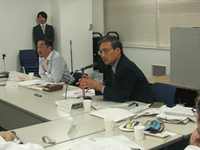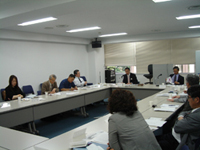Center for Interdisciplinary Study of Monotheistic Religions(CISMOR)Doshisha University
> Archives > 21st Century COE Program Archive > Research Groups > Research Group2 > 2005-0121st Century COE Program Archive
2005-01
| Date: | May 21, 2005 |
|---|---|
| Location: | Tokyo office, Doshisha University |
| Title: | Religious Conservatives in the Republican Conservative Coalition: Cooperation, and some Tensions |
| Speaker: | Fumiaki Kubo (Faculty of Law, University of Tokyo) |
| Title: | The Second-term Bush Administration and the U.S.-Japan Relationship |
| Speaker: | Koji Murata (Faculty of Law (Political Science), Doshisha University) |
| Summary: | |
| At this session Dr. Fumiaki Kubo (University of Tokyo) and Dr. Koji Murata (Doshisha University) gave presentations, followed by an active floor discussion. Dr. Kubo discussed in detail the relationship between the Republican Party’s Conservative Coalition and religious conservatism. Then he emphasized religious factors in order to understand the present Conservative Coalition. Conservatism in America represents a variety of trends based in principles often different from each other. America’s conservatism is different from that in Europe, which is characterized by big government and hierarchy. The key distinction is the connection between religion and politics. The Republican Party cooperated with religious conservatism for the sake of increasing its support in elections; this is the origin of the coalition between the Republican Party and religious conservatism. Religious conservatism is also comprised of various organizations, but Dr. Kubo pointed out that the more issues become political, the more the organizations make up a majority across issues and persuasions. The Conservative Coalition covers many issues, which sometimes produce tensions within the coalition. Negotiations on one such issue influenced the election in 2004: homosexuality became a winning issue for the reelection of George W. Bush. Dr. Murata analyzed personnel shifts and diplomacy issues concerning the security team (State Department, Pentagon, and National Security Council) in the second Bush Administration. He questioned the assertion that the change represents a hawkish shift in the administration, and then suggested a reassessment of Colin Powell, the former Secretary of State. Dr. Murata considers that the nominations of former Assistant Secretary of Defense Paul Wolfowitz for the presidency of the World Bank and former Deputy Secretary of State John O. Bolton for ambassador to the United Nations imply reforms of international organizations at the level of efficiency. In addition, these changes show Beijing, Pyong-yang, and Seoul that America is paying attention to the North Korean affair. Meanwhile, Dr. Murata pointed to 'first strike' capability, enlarging democracy, and unilateralism as the second Bush Administration’s diplomatic policy goals. Regarding 'first strike,' Dr. Murata argued that the Iraq War showed the ‘weakness’ of America as well as America’s inability to wage war equal in scale to the Iraq War; therefore, 'first strike' capability becomes practically a fall back position. He presumes that the goal of enlarging democracy will not meet major setbacks because he perceived that Bush’s diplomacy switched from a (F. D.) Rooseveltian to a Wilsonian style in his speech in Latvia. As regarding unilateralism, he suggested that Bush’s two visits to Europe indicate that the idea remains, but that diplomatic behavior is becoming more prudent. Finally, Dr. Murata pointed out three influences of this shift in diplomacy on Japan-America relations. Firstly, the Global Defense Posture Review (GDPR) of American forces raises transfer problems with respect to the Futenma base. Secondly, if constitutional revision occurs in Japan but the U.N. is not reformed, the question whether public opinion in Japan changes will become an issue. Finally, he discussed the China issue. He quoted Thomas P. M. Barnett (who regarded the world as being divided into two areas, a functioning core and a non-integration gap) in assessment of whether or not a Chinese threat is a problem for Japan. In conclusion, he noted that nationalism has recently become significant for Japan, China, Korea, and America. Tadayuki Kobashikawa (Graduate Students, Graduate School of Law, Doshisha University) |
|

